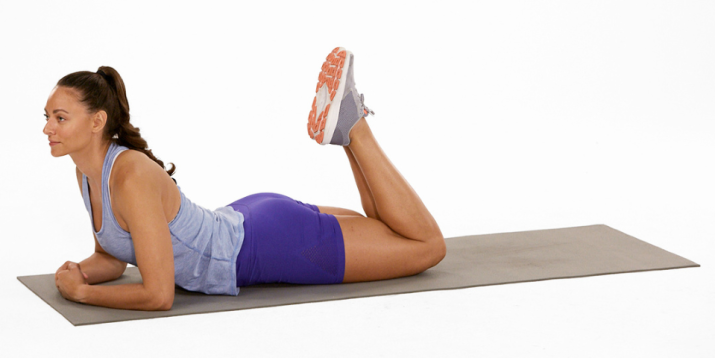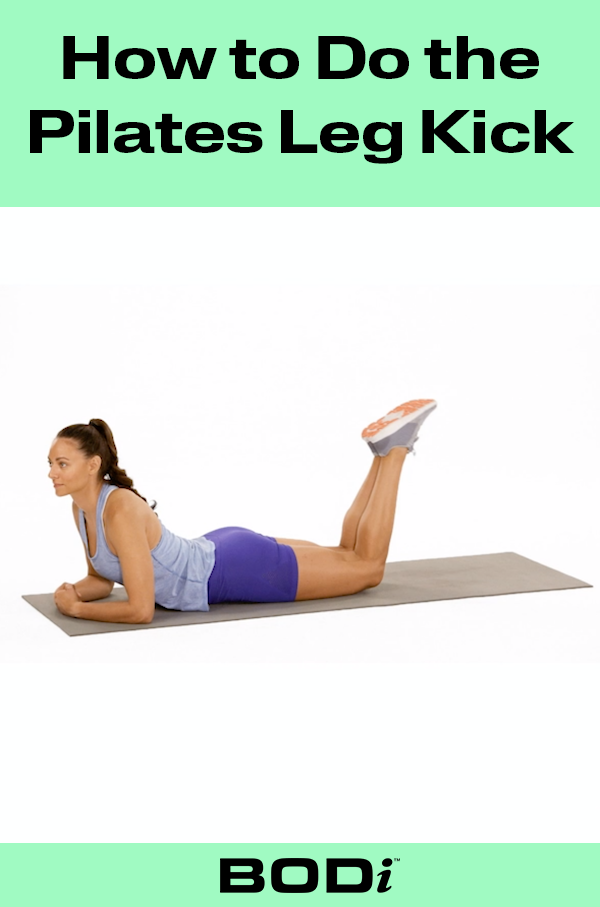How to Do a Pilates Leg Kick

Looking for a way to strengthen your back, tighten your glutes, and firm up your thighs without doing a squat or picking up a dumbbell? The Pilates leg kick is your new go-to.
The exercise is easy enough for beginners to master but can be intensified with a few simple modifications. And with the exception of a mat or soft surface, you don’t need any equipment to try them.
After a set of Pilates kicks or Pilates double leg kicks, you’re guaranteed to feel your muscles working.
Pilates Leg Kick: Step-by-Step Instructions
To get the most out of Pilates kicks, proper form is key. Stephanie Saunders, vice president of fitness programming at BODi, offers these tips for doing a perfect Pilates leg kick:
- Lie in a prone position (belly-down) on a mat or Pilates table. Turn your head to one side and interlace your fingers behind your lower back. Alternatively, you can lift your torso up and rest your forearms on the mat, with your hands directly under your shoulders and your fists pressed together.
- Draw your bellybutton into your spine, press your pelvis into the mat, and keep your legs and feet parallel.
- From this position, inhale as you point your toes and bend your knees to a 90-degree angle.
- Kick your heels toward your glutes three times, forcefully exhaling with each pulse. Inhale as you lower your legs down to the mat.
- Repeat until all reps are complete.
What Muscles Do Pilates Leg Kicks Work?
Saunders says that Pilates leg kick exercises strengthen the entire backside of the body by targeting the muscles that make up the posterior chain:
- Deltoids
- Trapezius
- Latissimus dorsi
- Erector spinae
- Triceps
- Glutes
- Hamstrings
- Soleus and gastrocnemius
“Pilates kicks create length in the spine and stretch the chest, shoulders, and hip flexors,” says Saunders. “They also teach the core to engage while the pelvis is pressed down.”
How to Make Pilates Kicks More Challenging
Do the basic Pilates kicks feel too easy? Challenge yourself with the Pilates double leg kick.
- Begin in a prone position with legs together. Turn your head so that your right cheek is resting on the mat.
- Draw your belly button toward your spine, interlace your fingers behind you, and rest your hands against the small of your back. Allow your elbows to drop toward the mat, but keep the fronts of your shoulders lifted off the mat.
- Inhale as you point your toes and bend both knees to a 90-degree angle.
- Keeping your pelvis pressed against the mat at all times, kick both heels toward your glutes three times, exhaling forcefully with each pulse.
- Inhale as you straighten both legs, lift your chest, and reach your hands back toward your feet. Keep your shoulders back and neck neutral.
- As you lower your chest back to the mat, bring your legs back to a 90-degree angle and allow your left cheek to rest against the mat. Kick the heels toward the glutes three times, exhaling forcefully with each pulse.
- Repeat, alternating the cheek that rests against the mat, until all reps are complete.
More experienced practitioners can also increase the intensity of basic Pilates kicks by keeping the extended leg lifted as they alternate legs (rather than allowing the leg to rest on the mat while the opposite leg kicks).
“The Pilates double leg kick can be made more advanced by adding in a squishy ball between the ankles, knees, or even upper thighs, or also by performing it on a Bosu ball,” says Saunders.
Pilates Leg Kicks Modifications
Like most Pilates exercises, kicking Pilates movements can be modified for injuries or level of experience.
For those who experience knee pain during Pilates leg kicks, Saunders recommends performing the movement but skipping the kicks.
If lower back pain is an issue, she suggests keeping your torso on the mat, with your hands under your forehead, while performing Pilates kicks.
“If lying prone is impossible, you could perform a similar motion while standing,” she says.

